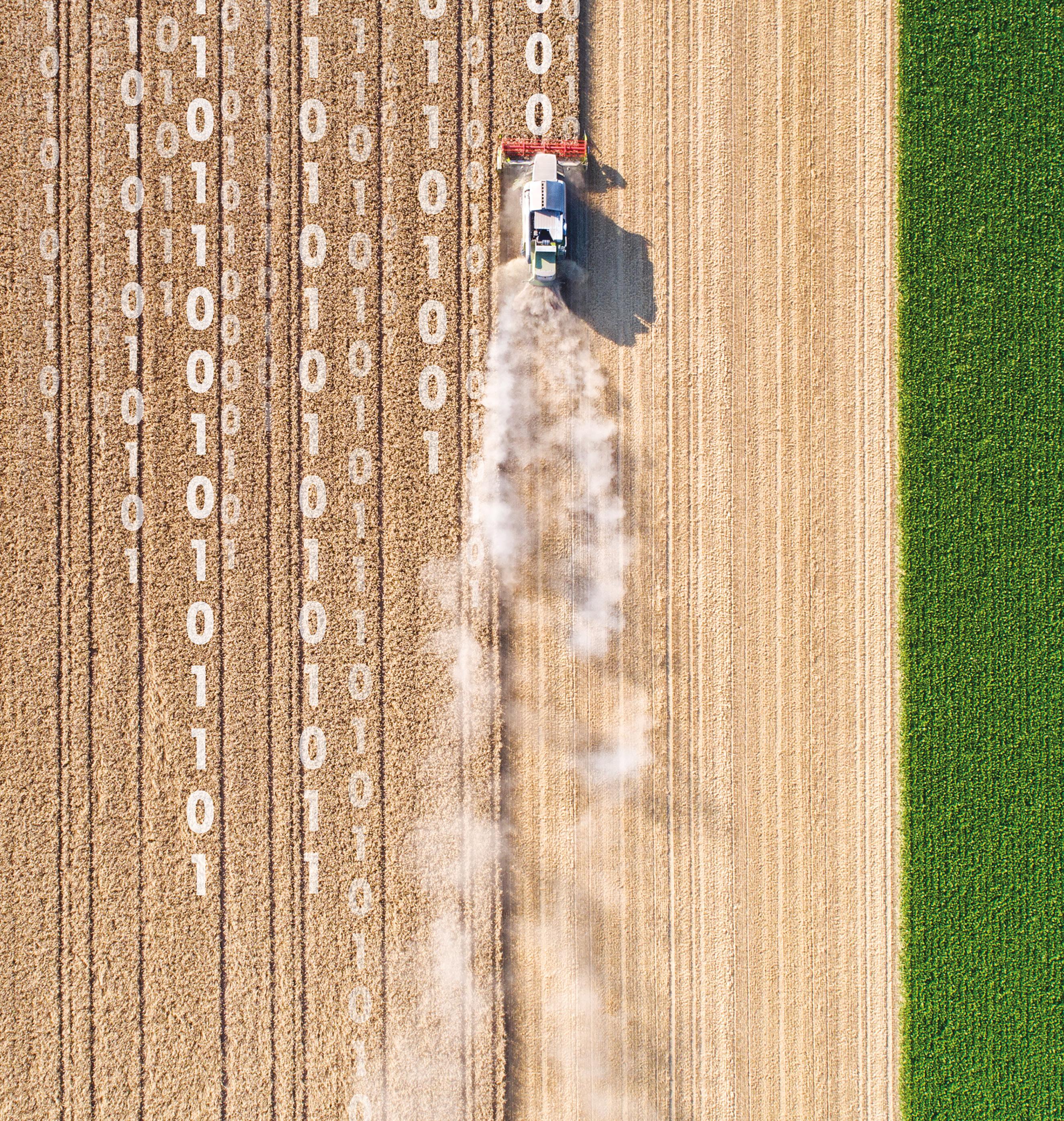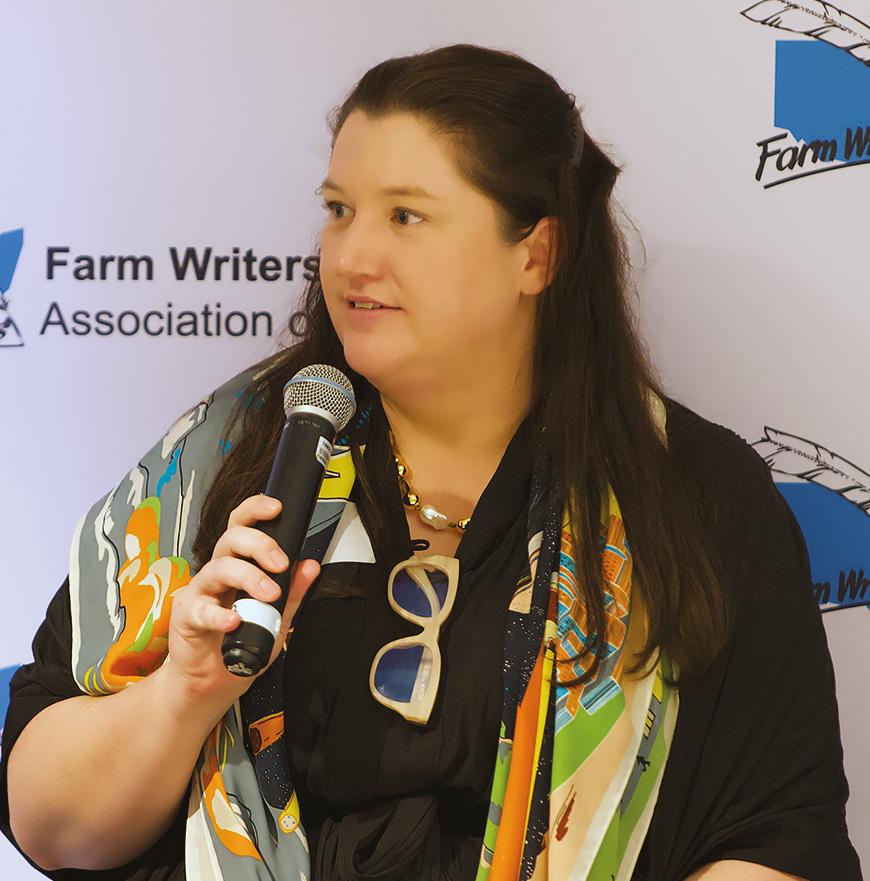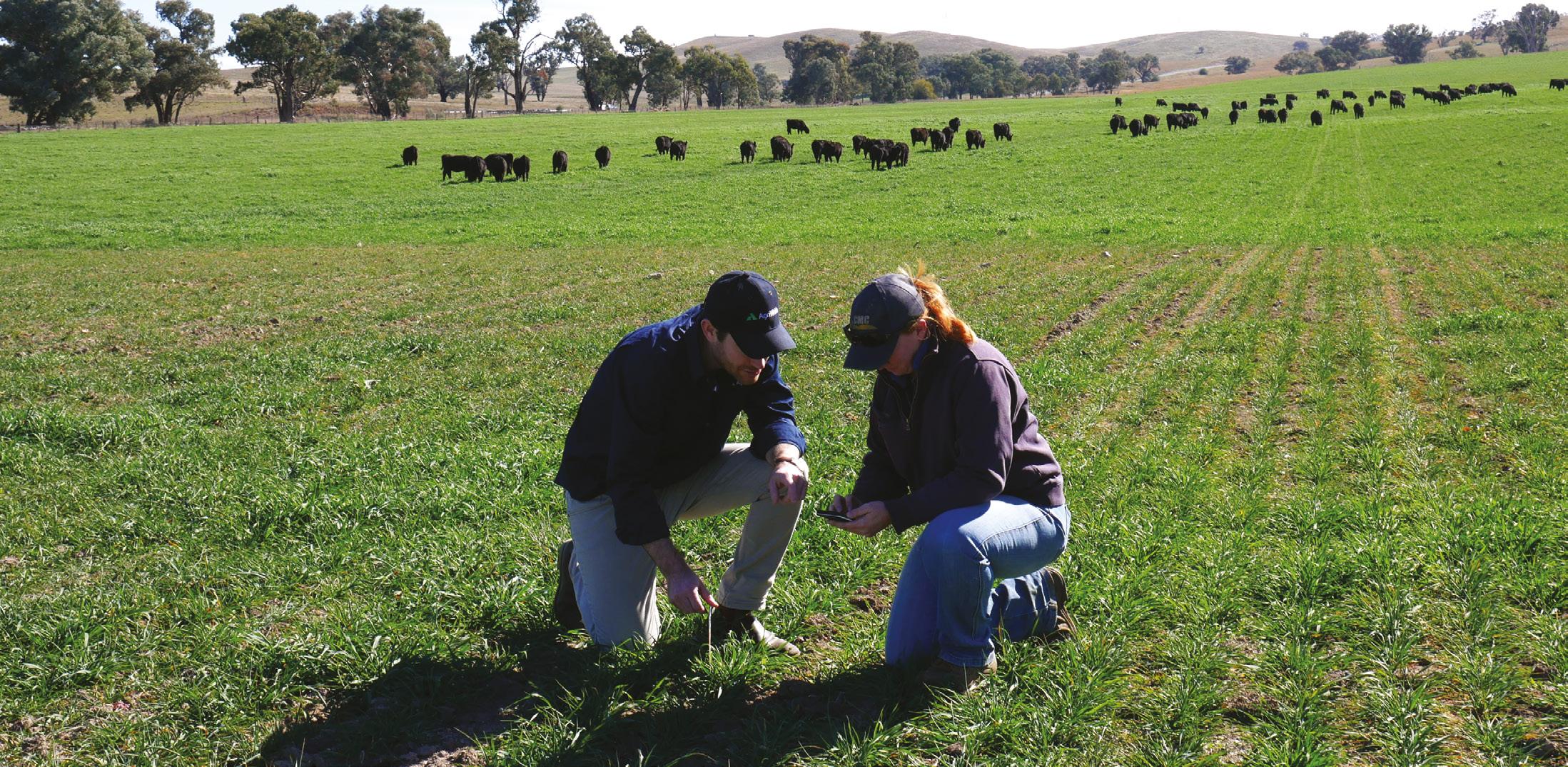
12 minute read
THE BIG ISSUE: DATA FARMERS
DATA FARMERS
- Words JAC TAYLOR
Growing up on a 400,000-acre sheep and cattle station in the northern Flinders Ranges in South Australia, a young John Fargher watched the business side of the family farm being run on the power of a pencil and a paper notebook, “which as often as not, ended up going through the washing machine or at the bottom of a trough,” he says “I think everyone’s familiar with that scenario ”
Now one of the co-founders of farm and livestock management platform Agriwebb, speaking at a recent NSW Farm Writers event in Sydney, John remembers when swapping the sodden, old notebook for better technology wasn’t quite as simple as downloading an app “For me, when I was growing up on our station, I thought, ‘surely there’s got to be a better way of doing this’,” he says
“I actually looked for some software to run our business. We found some, we bought some, probably 20 odd years ago, and it came on a floppy disk and stayed that way in the top drawer of the office. That was ultimately my experience with trying to get into software and technology as a whole
“When we started the journey back in 2014-2015, we used to cite a stat that 95 per cent of farmers were still honestly running their business out of pencil and paper and there was very little digital adoption,” says John. “That has shifted dramatically.

“We ran a global survey of farmers and found that over 15 per cent of farmers believe now that data and technology are critical to their business, and critical to the industry to move forward.
“The proof is in the pudding now Agriwebb is one vendor out there, and we have more than 25 per cent of the animals in Australia on the platform, so that would indicate that at least 25 per cent of the industry has digitised. We’ve come a long way in that journey.
“When we started in 2015, we would hear, ‘I’m scared of the cloud. Don’t put my information in the cloud’ and we would answer, ‘Do you have a bank account? Well, you’re in the cloud Sorry!’ So that conversation has finished.
The situation is rapidly changing, as such global technology as geospatial monitoring, community and resource mapping, and all-around improved connectivity, combine to remove the last scraps of analogue life from primary production.
And so you’re a participant whether you want to be or not. The question becomes: are you a proactive participant in the collection, analysis and sharing of your data? Or are you going to have it happen to you? If you decide that you’re an active participant, have you got the agency, or are you subcontracting that data to your vendor collection platform?
- ANDREW WARD Regen Farmers Mutual
John has seen the conversation now to have shifted toward more sophisticated questions about data privacy and security – who owns it, and where it’s being shared.
“Software and technology companies spend a lot of effort and time making sure that we are securing that information. The farmer owns the data. I think you’ll get that same comment from anyone that’s legitimate in the industry because if they weren’t, they wouldn’t be in the industry because they wouldn’t have customers."
IF YOU DON’T DO IT, SOMEONE ELSE WILL
Simply put, the new global landscape of digitised business, wrapped up with the need to track emissions and trace livestock in a more exacting way, means that data is no longer simply the information that helps to run a farm more efficiently on a singular scale. Data is the product itself – and several industry voices now agree that if you are not collecting and using your data, others may do it instead
Andrew ‘Wardy’ Ward is one of these voices As an agriclimate specialist at the democratically farmer-owned Regen Farmers Mutual, Andrew has a responsibility to provide market-based advice to the mutual’s members, from the farmer’s perspective that effectively gives them the digital tools to collect, analyse and share their data.

“In my world, a lot of data relates to a carbon market project, so I’m going to use the high levels of confusion and low levels of engagement with carbon markets as a proxy for data,” he says “In terms of how data can inform autonomous tractors or rain gauges remotely – I’m not an expert in that But I do know that a lot of farmers are very anxious about carbon markets, which are data markets.
“Some might not want to participate to collect and share data but what they’re failing to understand is that the banks have decided that the equivalent of their customers’ Scope 3 emissions, and supply chains – whether these are domiciled in Australia, Singapore, the US, or Europe – they’ve decided that their emissions are the sum of their supply shed
The way I view this is that a farmer needs to digitalise their business to be successful in any challenge or opportunity they face now.
–JOHN FARGHER Agriwebb
“They’re looking at farmers saying, ‘Ah, some of you are just not getting this. You’ve got technical barriers. We might just be better off instead asking you for permission and assistance to collect this data, to use these fancy multispectral satellites to collect that data on your behalf, and then we will understand the emissions of your supply shed And hey, if you’re selling us beef, wheat, or wool, or whatever the commodity is, you can still sell that to us, but we’re also going to take the cost of offsetting your emissions into account.'
“That will be the real risk for farmers. If they withdraw from the data markets, if they withdraw from the carbon markets. If they put their head in the sand, it doesn’t mean that they’re withdrawing their participation from the broader economy, because there’s not a farmer who doesn’t sell into wholesale supply chains or have a mortgage
“And so you’re a participant whether you want to be or not. The question becomes: are you a proactive participant in the collection, analysis and sharing of your data? Or are you going to have it happen to you? If you decide that you’re an active participant, have you got the agency, or are you subcontracting that data to your vendor collection platform?”
SIGNING UP
Pip Grant, Director of the Australian Grower Extension and Adoption sector of biotechnology organisation Loam Bio, has said more than once in the past that the growing need for farm data to address Scope 3 emissions cannot be emphasised enough, in order to achieve Net Zero These days, she is on the frontline and in a prime position to gauge sentiment among the farming community on the subject
“My day-to-day job is sitting down with farmers at their kitchen table and selling them a carbon project, which is a 25-year commitment that involves us, a heap of sharing of data and the government statutory authority,” she says. “After about 150 conversations, I’ve never had a farmer say ‘Oh, who’s going to get my data there?’
“The sharing of the data is not a challenge What they want to be explained is how is that data monetised ‘How do I build carbon in a cropping system?’ I think the data-sharing conversation keeps coming up [in the wider community], but I wouldn’t want anyone saying that barriers to our farmers becoming more sustainable in a way that we can see, in a digital platform, is because they don’t want to share their data ”

Loam Bio’s overarching mission is, to quote their marketing material, to “use the world’s smallest organisms to solve the world’s biggest problems”. Their project to tackle the climate crisis by better understanding how soil-borne microbes influence the carbon cycle, and creating new carbon sequestration opportunities, all hinges on the second-most important ingredient after those little microbes – and that’s data So Pip isn’t backwards in coming forwards about how farmers sharing their data directly leads to research that is set to improve agricultural productivity long-term.
“It’s understanding the mechanisms of building soil carbon, monetising it, and trading it. And everyone’s learning together. These are 40-page contracts that we’re sitting down with alongside farmers, and there are clauses in there that say, ‘we need this data from you, in order to do your GHG baseline, to keep you compliant with the ERF regulatory system’ Of all the clauses in the contract, not one conversation has been around ‘what is going to happen to my data’ or ‘why do you need it?’.
“I want all of your data. I want everyone’s data, because that’s when it becomes knowledge. And I don’t want it for nefarious reasons I’m not going to sell it to John Deere’s marketing department and do some machine learning on exactly what archetype you can sell a million-dollar piece of equipment to I come from an R&D background We want to make exponential breakthroughs in on-farm efficiencies.”
PROVING EMISSIONS WITH DATA BRINGS PREMIUMS
John Fargher adds: “The way I view this is that a farmer needs to digitalise their business to be successful in any challenge or opportunity they face now. I honestly believe that, because I wouldn’t do what I’ve been doing for the last 10 years otherwise; this is around productivity, efficiency, and growth. It is about financing and it is around the supply chain.
“What we’re seeing now is something that we’ve never experienced before and maybe we won’t see that again in our lifetimes The freight train that’s coming towards us is around corporations now needing to report on Scope 3 emissions.
“Just to provide some context for that, we’re now seeing food supply chain participants – McDonald’s, banks, financial institutions that have made certain commitments such as shareholder and board members regulatory amendments saying, ‘Hey, we’ve said we are going to be Net Zero by 2050 and reduce our emissions by 30 per cent by 2030 ’
“That’s not much time That’s six to seven carbon seasons away. Scope 1 and Scope 2 are within their control largely because Scope 3 is at the start of that supply chain.
“If you look at McDonald’s, for example, they have never had to get that close to a farmer ever before They’ve always talked about animal health and welfare and they probably believe that, considering that they’ve never had to activate and engage a farmer They are the biggest consumer of beef globally. To satisfy science-based, Scope 3 emission targets, they have to report on-farm data.

“That is a market access issue because we will see a scenario where there could be this Mexican standoff, where the supply chain says, ‘Hey, we’re not going to buy from you unless you provide data that solve my Scope 3 emissions’ and the farmer may sit back and say, ‘well, I’m just not going to lie to you because I think you’re rinsing me’
“We’re seeing it in supply chains, where farmers are consenting to provide data in a supply chain, and they are getting a premium. They’re not only getting a premium for their product delivery, but they’re getting paid to enter quality data. That’s how important it is and that’s how we can get real value back to the farmer
“I think data is nothing new,” John adds “We’ve been collecting it for a long time, whether that is in a notebook or written on the dashboard of the ute The important thing is to make sure it’s in a very useful format. There’s always a big misconception where farmers ask: isn’t my data so valuable? Yes, it is, but it’s got to be of good quality, in the right environment, and then delivered to the right participants to have value We need to be having the right conversation around what is valuable and what isn’t.
“We’re now in a world where we can collaborate, communicate and share data of high quality in a useful, regular format that can then ultimately add value back to the farmer and to the broader value chain.
“It’s my strong belief that we’re not going to solve anything without digitising and without collaborating, integrating, and partnering Sitting in silos and saying, ‘My data is valuable and I’m not going to share it with anyone’ is not going to get us where we need to get to
“I don’t mean farmers should just give away their data, but we need to change a lot of the mindset around the value of digitising, and make sure we have a very collaborative approach. If we don’t take that approach, I don’t think we’re going to be successful, and this industry is just not going to get to where it needs to get to.”



